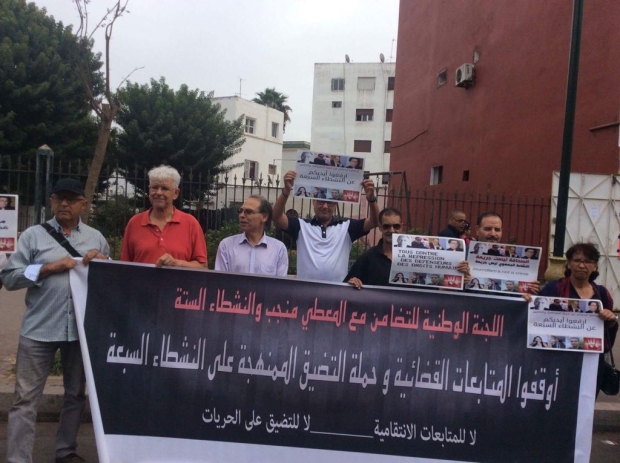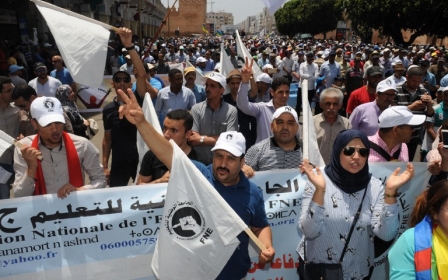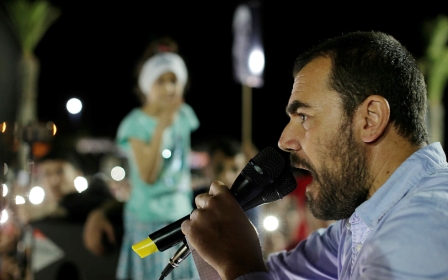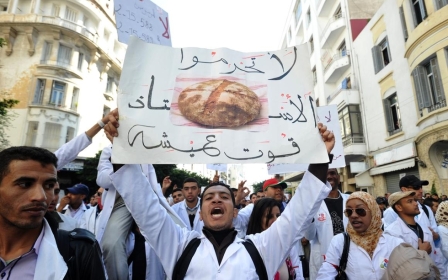Activists on trial in Morocco for violating national security after using app
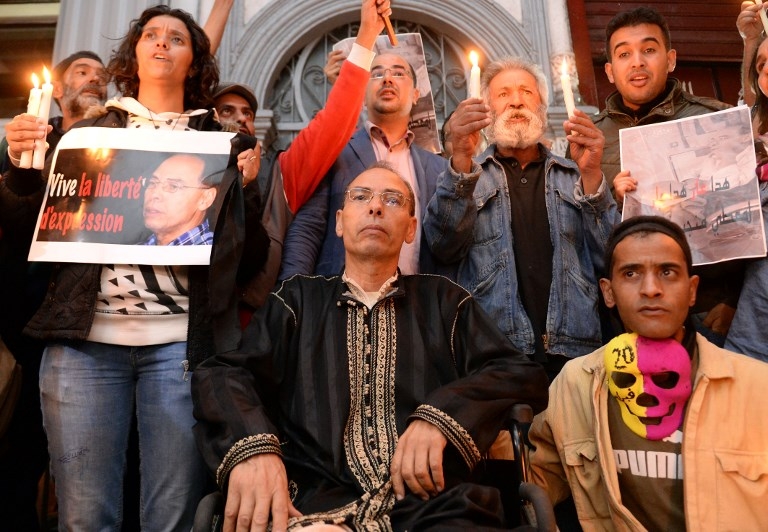
MARRAKECH, Morocco – The trial of seven Moroccan writers and pro-democracy activists has again been postponed, some accused of undermining national security, amid a crackdown on pro-democracy voices.
The seven have been accused for allegedly promoting independent journalism, after teaching citizen journalists how to use Story Maker, a smartphone app that produces and publishes news stories.
Five stand accused of violating national security and could face up to five years in prison. The other two are accused of benefitting from foreign funding to harm the image of Morocco.
“This trial is political,” said Maati Monjib, a Moroccan historian at Mohammed V University in Rabat who is among those charged with a national security violation. “Its aim is to silence us.”
A court in Rabat on Wednesday postponed the trial, for the ninth time in two years.
'This trial is political ... Its aim is to silence us'
- Maati Monjib, defendant
The delay was as a tactic to cow the defendants, said Eric Goldstein, Middle East and North Africa deputy director of Human Rights Watch.
“This is not the first time Moroccan authorities keep the prosecution open while delaying the trial for years as a means of keeping a sword hanging over Maati Monjib and his co-defendants,” he said.
Monjib, whose work has been published by think tanks like the Brookings Institution and The Carnegie Endowment for International Peace, is also a member of the Moroccan Association for Investigative Journalism, a founder of the Ibn Rochd Center for Studies and Communication that closed in 2014 following pressure from the government.
He is the co-founder of Freedom Now, an organization that promotes free speech and independent journalism. He is also a frequent commentator on Morocco for the international news media.
“In 2013, the regime started seeking revenge against everyone who participated in the February 20 Movement,” he added referring to the protests in 2011 in Morocco that called for democracy and other political and economic reforms.
Sputtering change
King Mohammed VI appeared open to reforms in the wake of those demonstrations, but critics have said change has sputtered.
“The trial of Maati Monjib and his colleagues is yet another reference point in the long and continuing slide toward clear-cut authoritarian rule, with no adjectives to qualify it,” said Abdeslam Maghraoui, a Professor of Political Science at Duke University and North Africa expert.
“Democracy advocates in Morocco will have to stop fooling themselves about the possibility of democratic reforms from above. It is not going to happen.”
'Democracy advocates in Morocco will have to stop fooling themselves about the possibility of democratic reforms from above. It is not going to happen'
- Abdeslam Maghraoui, North Africa expert
Human rights groups decried the trial as another indication of the steady erosion of freedom in Morocco the last few years as the state has cracked down on pro-democracy voices emboldened by the Arab Spring seven years ago.
This year, several journalists, among them citizen reporters covering the unrest in the Rif region in northern Morocco, have been jailed.
Monjib learned he was under investigation when he was briefly detained and questioned by authorities in August 2015 at the Mohammed V airport in Casablanca as he was returning from a trip from abroad.
The police questioned him again in the weeks that followed and, for a while, he was banned from leaving the country.
After they stopped him from going to Barcelona and Norway in 2015, he started a hunger strike in October of that year to protest the harassment and the travel ban. That ban was subsequently lifted but he was then formally charged in court.
The government’s spokesman, Mustapha Khalfi, did not respond to requests for comment.
The press freedom advocacy group Reporters Without Borders warned that the state of free speech in Morocco is showing “a slow but steady decline.”
According to the New York-based advocacy group Human Rights Watch, Moroccan authorities harass journalists, stage unfair trials, impose heavy fines and imprison journalists to discourage them from conducting critical reporting.
As the penal code still punishes nonviolent speech with prison terms, Moroccan journalists widely self-censor themselves as a result.
Article 206 of the Penal Code states that 'a person is guilty of harming internal state security [...] if he, directly or indirectly, receives [support from abroad intended, or used, to finance] an activity or propaganda capable of harming the integrity, sovereignty or independence of the kingdom'
Monjib and his co-defendants are being tried under article 206 of the Penal Code, which states that “a person is guilty of harming internal state security [...] if he, directly or indirectly, receives [support from abroad intended, or used, to finance] an activity or propaganda capable of harming the integrity, sovereignty or independence of the kingdom.”
Fleeing Morocco
Moroccan officials have shut down independent press outlets through advertising boycotts and other kinds of pressures on journalists in recent years. Penalties for infractions have grown stiffer, too. Criticising the royal family or Islam, for example, is an offense punishable with prison sentences.
Three of the co-defendants have fled Morocco, including Hicham Mansouri, a young investigative journalist and former colleague of Monjib’s.
Mansouri spent months in prison on adultery charges in 2015 in a country where sex outside of marriage is illegal. Several human rights groups said that the charges were politically motivated.
'I don’t want to spend five years of my life in jail in hellish conditions. I prefer working on my doctoral thesis'
- Hicham Mansouri, defendant
The day after he was released from prison, Mansouri left Morocco. He spent some time in Tunisia and Poland and now resides in Paris after the United Nations granted him refugee status. He is now studying political science in France.
“I have lost complete trust in the Moroccan justice,” Mansouri said.
“It is not reassuring that the judge that put me in jail – despite all the proof presented by my lawyers and my neighbours – is the same one handling this case. I don’t want to spend five years of my life in jail in hellish conditions. I prefer working on my doctoral thesis.”
Middle East Eye propose une couverture et une analyse indépendantes et incomparables du Moyen-Orient, de l’Afrique du Nord et d’autres régions du monde. Pour en savoir plus sur la reprise de ce contenu et les frais qui s’appliquent, veuillez remplir ce formulaire [en anglais]. Pour en savoir plus sur MEE, cliquez ici [en anglais].


